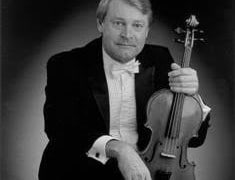Cleveland pressures faculty not to join union
OrchestrasThe Cleveland Institute of Music is doing all it can to stop unhappy staffers from joining a union. It’s getting heated out there.
First up is board member Bonnie Cook:
Next, here’s a round-robin letter from Robert Vernon (pictured), retired principal violist of the Cleveland Orchestra (1976 to 2016) and CIM Professor of Viola for almost 50 years
Dear Friends and Colleagues,
I am writing to you to provide my perspective on the potential unionization of the Faculty at CIM. Having been an AFM member for more than fifty years and a member of CIM’s faculty for nearly as long, I hope that what follows will be helpful as you consider this important matter.
My long-held position has been that unions have a role to play in representing members of orchestras, largely because of the evolution of symphony orchestras over the past several decades. As we all know, the management of an orchestra encompasses complex human resource, finance, and artistic considerations, and the potential for section players especially to be disadvantaged has been mitigated successfully by the Cleveland AFM for some time. The pressures on orchestras to generate revenue from concerts, recordings, and touring are substantial enough that a functional union helps to manage players’ position when contracts are being negotiated.
Nevertheless, CIM is, in my view, a very different organization from the Cleveland Orchestra, with very different operational, financial, and artistic realities and pressures. Throughout its now more than 100 year history, we have been able to navigate those realities without resorting to bringing in a third party negotiator for our compensation.
I believe that this is appropriate, and even essential, in order for CIM to thrive, for the following reasons:
• AFM’s leadership and negotiators have no experience in negotiating salaries and compensation for college or university faculties. Whereas in the world of professional orchestras a strong union leadership has ready access to comparable contract information from other similar orchestra negotiations, this experience simply will not exist in the context of CIM’s contract negotiations. AFM will have to “figure things out” as it goes along, and this is likely not in our best interest.
• Recognizing that there have been significant differences of opinion on certain aspects of CIM’s aspirations and leadership, AFM will only represent you for compensation contracts. My understanding is that they will have no other function, and so, it will likely not be effective in helping to bridge those non-compensation disagreements.
• I continue to believe that a strong Faculty Senate leadership, along with a strong Dean’s Council, is the best path forward for our faculty and administrators. We know CIM, and AFM most certainly does not. We need maximum flexibility, and in many cases we benefit from receiving customized compensation packages. This mode of longstanding engagement will be a thing of the past if AFM takes charge of these negotiations.
In summary, I do not believe that unionizing will provide the solutions some on the Faculty currently seek. I believe that honest, direct dealings will always be the better route.
Warmly,
Bob






Comments